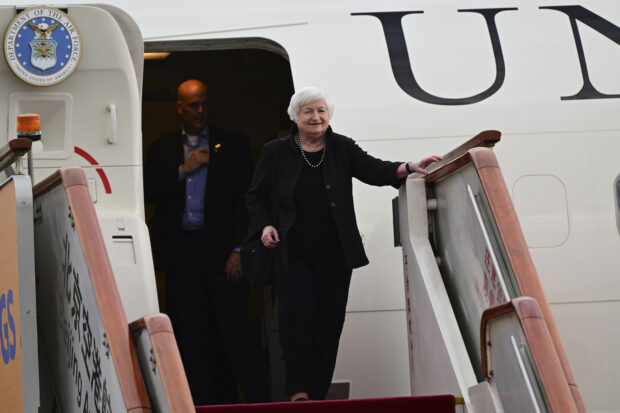Yellen’s visit to Beijing aims to heal rifts over an array of China-US antagonisms

Treasury Secretary Janet Yellen arrives at Beijing Capital International Airport in Beijing, China, Thursday, July 6, 2023. (Pedro Pardo/Pool Photo via AP)
BEIJING — Treasury Secretary Janet Yellen is visiting Beijing as part of efforts to revive U.S.-Chinese relations that are at their lowest level in decades due to disputes over technology, security and other irritants.
Presidents Joe Biden and Xi Jinping met in November and agreed to improve relations between the world’s biggest economies and major trading partners. But neither government has shown willingness to make major policy changes.
“We hope the United States takes concrete actions to create a favorable environment for the healthy development of economic and trade relations,” the Chinese finance ministry said in a statement Friday.
It expressed hope for “the realization of mutual benefit and win-win results” but did not suggest possible Chinese concessions.
Yellen’s visit follows one by Secretary of State Antony Blinken, who met with Xi last month in Beijing in an encounter that lasted just 30 minutes.
Here’s a look at some areas of contention.
Political relation
U.S.-Chinese relations are riven by disputes over technology, security, human rights, Beijing’s assertive policies abroad and its support for Russia during its war on Ukraine. Despite an agreement between Biden and Xi to improve relations during a meeting in Indonesia in November, ties worsened after a Chinese surveillance balloon drifted over the United States in February and was shot down. Secretary of State Antony Blinken flew to Beijing in June in the highest-level U.S. visit in five years and had a meeting with Xi that lasted just 30 minutes.
Export controls
The United States has blocked Chinese access to advanced processor chips and other technology on security grounds. Beijing has been slow to retaliate, possibly to avoid disrupting China’s fledgling developers of artificial intelligence and other technologies. But this week, Beijing announced controls on exports of two minerals used in semiconductors and solar panels — gallium and germanium. In May, China banned using products from the biggest U.S. maker of memory chips, Micron Technology Inc., in computers that handle sensitive information, saying they had unspecified security flaws but gave no explanation.
China to restrict exports of chipmaking materials as US mulls new curbs
Russia and Ukraine
Xi’s government said it had a “no limits” friendship with Moscow ahead of its February 2022 invasion of Ukraine. Beijing has provided political support for President Vladimir Putin’s government and has blocked efforts in the United Nations to criticize the Kremlin. China also has stepped up purchases of Russian oil and gas, helping to offset revenue losses due to Western sanctions. Washington has warned Beijing not to provide military support.
Territorial disputes
The United States rejects China’s claim to sovereignty over most of the South China Sea, where Beijing has built artificial islands and stationed naval forces. Chinese claims overlap with those of Vietnam, Malaysia and U.S. ally the Philippines. Washington and its allies have sent warships through the sea to assert their “freedom of naviation.” Beijing rejects that and says the United States is adding to tension over the region. China also claims the self-ruled island democracy of Taiwan as part of its territory. Xi’s government has stepped up efforts to intimidate Taiwan’s elected government by flying fighter jets near the island and firing missiles into the sea. American politicians including then-Speaker Nancy Pelosi of the U.S. House of Representatives have visited Taiwan in a show of support.
Decoupling or derisking?
Businesspeople warn the world might decouple, or split into separate markets with incompatible industrial standards and products, as the United States and China tighten export controls and try to reduce reliance on each other. They say that would slow economic growth and innovation. Yellen has warned decoupling would be a disaster. Treasury officials said ahead of her trip she would deliver that message to Chinese officials. “There will be no winners in trade wars or ‘decoupling and broken chains,’” the Chinese finance ministry said. There are also deep financial ties: China stockpiles part of its trade surpluses and foreign currency reserves in Treasury debt, which helps to finance U.S. government budget deficits.
Yellen urges China to adopt market reforms, says U.S. not decoupling
Room for cooperation
Treasury officials said Yellen planned to encourage Chinese officials to work with Washington on areas of common interest including climate change. China signed onto a deal last month to reduce debts owed by the Zambian government. Treasury officials pointed to that as an example of areas where cooperation produced results.